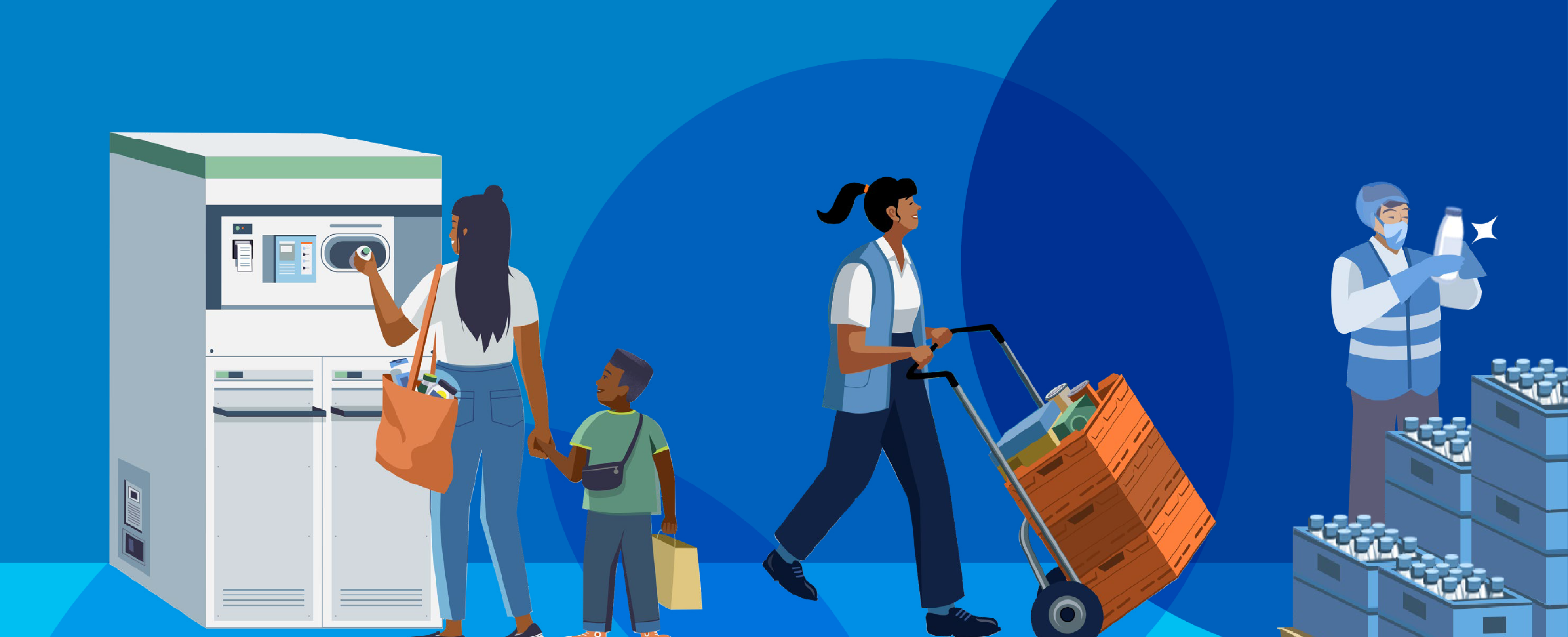New study calls for a reuse revolution to tackle plastic crisis
Returnable packaging has the potential to offer significant environmental benefits, and – once scaled up using the right approach – can compete with the economics of single use packaging for certain products, a new study from the Ellen MacArthur Foundation has shown.
The ‘Unlocking a reusereuseThe repeated use of a product or component for its intended purpose without significant modification. revolution’ study shines a light on the benefits of adopting reusable plastic packaging for selected beverage, food cupboard, personal care, and fresh food items, when designed collaboratively across the industry and operated at large scale.
It has been developed with input from more than 60 leading organisations including the European Investment Bank, national governments, reuse experts and major brands and retailers such as Danone, Nestlé, PepsiCo, The Coca-Cola Company, and Unilever.
Recent findings in the Foundation’s ‘Global Commitment Five Years In’ publication suggest that without a significant shift towards reuse, worldwide virgin plastic use in packaging is unlikely to decrease below today’s levels before 2050. It identified the scaling of reuse as one of the key hurdles to overcome in reversing the tide on plastic waste and pollution.
The latest study from the Foundation, an international charity which develops and promotes the circular economycircular economyA systems solution framework that tackles global challenges like climate change, biodiversity loss, waste, and pollution. It is based on three principles, driven by design: eliminate waste and pollution, circulate products and materials (at their highest value), and regenerate nature., shows that in the most ambitious scenario, returnable plastic packaging could lower greenhouse gas emissions and water use, by 35% to 70% compared with single-use plastics.
Sander Defruyt, Plastics Initiative Lead at the Ellen MacArthur Foundation, said: “It’s time for a reuse revolution. Embracing this gives us the opportunity to tackle plastic pollution, ease pressure on our natural resources, and make strides towards net zero.
“Scaling reuse will be a major transition and won’t happen overnight. This analytical study gives us greater insight into the key drivers that affect the environmental and economic performance of return systems. Yet, it doesn’t have all the answers. We now need to see more research and groundwork in specific geographies and sectors to determine the best course of action and make return models at scale a reality.
“No single organisation can drive the necessary change by itself; it will require a collaborative effort from businesses, policymakers and financial institutions. Together they can kick start the reuse revolution and get the world on track to tackling the plastic crisis.”
The study, developed in partnership with Systemiq and Eunomia, focuses on returnable packaging, which once bought and returned by customers, is professionally cleaned and refilled before being sold again.
To drive global change, the Foundation is calling on leaders across the private, public and finance sectors, to take a fresh approach to expand a reuse revolution through shared infrastructure, packaging standardisation, and to work collaboratively to reach high return rates.
Ambroise Fayolle, Vice President at the European Investment Bank, said: “This valuable study issues a blueprint for achieving the crucial step-change from recycling to reuse in a global economy. Shifting towards reuse systems can increase circularity at scale, whilst at the same time creating new business options and social benefits.”
Jolanda de Rooij, Senior Sustainability Manager Circular Economy at Unilever, added: “We’re pleased to be working with the Ellen MacArthur Foundation and other industry partners to explore the economic, environmental, and experiential impacts of reuse models versus single-use.
“Getting these models working economically at scale, however, will take time and will require significant collaboration between retailers, manufacturers, policymakers, and civil society. Fragmented efforts will not be enough to drive the necessary systems change.”
The Foundation has highlighted the important role of policy in scaling reuse. It sees the ongoing development of the European Packaging and Packaging Waste Regulation, and negotiations for a Global Treaty to End Plastic Pollution, as major opportunities to put in place ambitious reuse policies, including time-bound, sectoral reuse targets, together with the enabling conditions needed to help reuse thrive.
For further information, please visit emf.org/reuse-revolution
–ENDS–
Notes to Editors
ABOUT THE ELLEN MACARTHUR FOUNDATION
The Ellen MacArthur Foundation is an international charity developing and promoting the circular economy in order to tackle some of the biggest challenges of our time, such as climate change, biodiversity loss, waste, and pollution. We work with our network of private and public sector decision-makers, as well as academia, to build capacity, explore collaborative opportunities, and design and develop circular economy initiatives and solutions. Increasingly based on renewable energyrenewable energyEnergy derived from resources that are not depleted on timescales relevant to the economy, i.e. not geological timescales., a circular economy is driven by design to eliminate waste, circulate products and materials, and regenerate nature, to create resilience and prosperity for business, the environment, and people.



